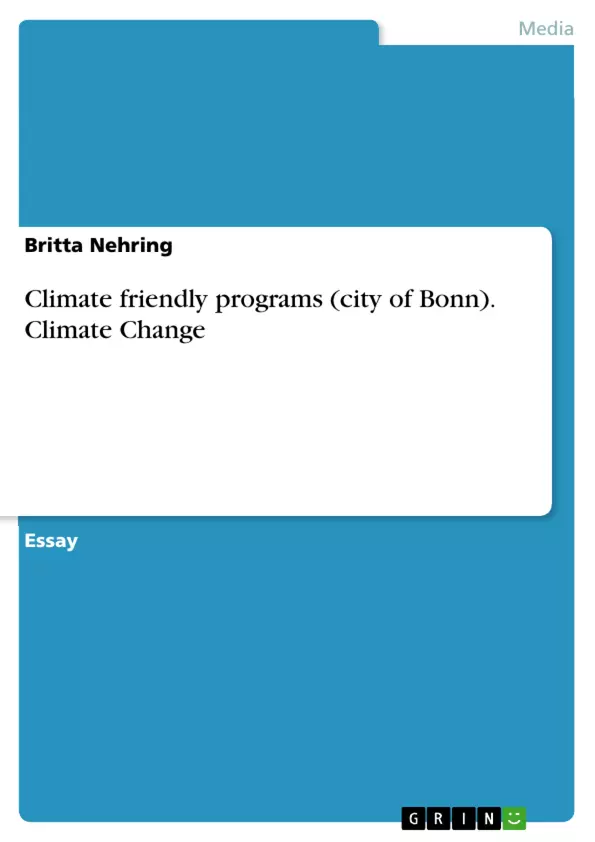The Coronavirus-crisis came over to us from Asia. At first, the full impact of the Corona pandemic was not yet apparent. The consequences for the economy and society are still not fully foreseeable. Programs must be put in place to strengthen the local economy. Sustainability and green power has been pushed in the background by the media and political attention of the Covid 19 pandemic. This paper addresses the question, which initiatives make sense for a city to conserve resources and become more environmentally friendly. The pandemic is currently being played out on the backs of children, who are experiencing distance learning and emergency care, unable to see their friends and a peer group that they so desperately need for proper development. Isolation and learning home alone is on the agenda for the next generation. There are studies already that outline increased behavioural problems in children, due to the political Corona instruments. In addition to the psychological consequences for society, especially for the youngest, debts amounting to billions are incurred. Medially the agenda is filled almost totally with Covid reports - for other topics space hardly remains. At the same time, it is important to not forget the other challenges the world is facing: The climate crisis, demographic change, the digitalization that has become most obvious and is lagging far behind in Germany. So, in addition to the damage caused by the current pandemic, we are passing on many other problems to our next generation. That is why municipalities should urgently respond with political initiatives, so problems such as climate change must not be allowed to fade into the background. Accordingly, the following questions are addressed in this paper: brief introduction of the topic of the Corona pandemic in Bonn, the climate change and its effects, as well as possible courses of action for the Bonn local politics, which is now even governed by the parliamentary group of Bündnis 90 die Grünen.
Inhaltsverzeichnis (Table of Contents)
- Introduction
- City of Bonn
- Climate Change (Consequences)
- Programs
- I. Community Supported Agriculture (CSA)
- II. Bicycle infrastructure
- III. Green Roofs
- Conclusion
Zielsetzung und Themenschwerpunkte (Objectives and Key Themes)
This policy paper explores the question of which climate-friendly programs should be implemented or supported by the City of Bonn to stimulate the regional economy. It examines the effects of the COVID-19 pandemic on climate change initiatives and emphasizes the urgent need for municipalities to respond to climate change challenges.
- The impact of the COVID-19 pandemic on climate change initiatives.
- The urgency for municipalities to respond to climate change challenges.
- Climate-friendly programs that can be implemented or supported in Bonn to boost the regional economy.
- The role of the Green Party in promoting climate-friendly policies in Bonn.
- The importance of green spaces, sustainable transportation, and renewable energy in addressing climate change.
Zusammenfassung der Kapitel (Chapter Summaries)
- Introduction: The paper introduces the topic of climate-friendly programs in the context of the COVID-19 pandemic and its impact on sustainability initiatives. It highlights the need for cities to prioritize climate change action despite the pandemic.
- City of Bonn: This chapter provides a brief overview of Bonn, its history, demographics, and existing infrastructure. It emphasizes the city's commitment to environmental protection and its efforts to promote sustainable practices.
- Climate Change (Consequences): This chapter delves into the scientific evidence of climate change and its consequences, highlighting the urgency for action. It cites examples of the impact of climate change in Germany and globally, emphasizing the importance of addressing the issue.
- Programs: This chapter discusses potential climate-friendly programs that could be implemented or supported in Bonn. It outlines the potential benefits of Community Supported Agriculture (CSA), bicycle infrastructure, and green roofs for both the environment and the local economy.
Schlüsselwörter (Keywords)
The paper focuses on climate-friendly programs, sustainability, urban planning, regional economy, green initiatives, renewable energy, transportation, environmental protection, and the impact of the COVID-19 pandemic on climate change action.
Frequently Asked Questions
What is the main question addressed in this paper?
The paper explores which climate-friendly initiatives make sense for a city like Bonn to conserve resources and strengthen the local economy after the pandemic.
How did the COVID-19 pandemic affect climate initiatives?
Media and political attention shifted toward the pandemic, pushing sustainability and green power into the background despite their ongoing urgency.
What climate-friendly programs are suggested for Bonn?
Suggested programs include Community Supported Agriculture (CSA), improving bicycle infrastructure, and promoting green roofs.
What are the social consequences mentioned regarding the pandemic?
Isolation and distance learning have led to increased behavioral problems and psychological consequences for children and the next generation.
Why is the role of the Green Party in Bonn significant?
Since Bonn's local politics are now influenced by the Green Party, there is a unique opportunity to push for more environmentally friendly and sustainable municipal policies.
- Citar trabajo
- Britta Nehring (Autor), 2021, Climate friendly programs (city of Bonn). Climate Change, Múnich, GRIN Verlag, https://www.grin.com/document/1026989



